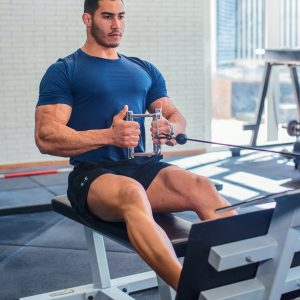Theoretically, one could justify the single rep system for building the largest muscle size. Some weightlifters are after explosive strength and use that system. But such a system does not serve the bodybuilder’s needs. The competitive weightlifter; who attempts to fire off as much muscle fibre as possible within the few seconds it takes to complete a single rep, will not gain the overabundance of muscle tissue that the top bodybuilders strive for. For muscle building purposes it is far better to use a lower percentage of muscle fibres each repetition, but with a higher overall count. In this way the nervous system is forced to recruit as many additional muscle fibres as possible. You need to fatigue the fibres with repetitions, overloading your muscles regularly with repeated sets of 6 – 12 reps, and progressively overloaded (moderately increasing weight resistance whenever possible). This will give you the kind of body development you’ve always wanted.
Volume is important, since it serves two purposes. It contributes to plumping up your muscles cells individually, and it helps you to build new capillaries (which come as a result of regularly performing plenty of sets and reps). This is why trained bodybuilders get a much bigger pump than Olympic lifters. Most advanced bodybuilders can add well over an inch to their arms by doing a few dozen close hand floor dips.
Another fact that has come to light and is the result of volume training is that the glycogen stored in the muscle can greatly increase. According to bodybuilding author Bill Dobbins whose knowledge is widely accepted, “Glycogen is carbohydrate energy stored in the muscles. For each gram of glycogen, the body will store 2.7 grams of water, all of which adds to muscle size and shape”. This is why glycogen-starved bodybuilders who are on too low carbohydrate diet appear stringy and small. It also explains the usefulness of “carbing up “the day before an important contest (usually done by eating a plate of spaghetti or a baked potato).
Having given you the case for a workout consisting of plenty of sets and reps, now let’s assume that there is also a case to be made for power building techniques (as used to prepare for power lifting) on an occasional basis. Using heavy weights for lower repetitions cannot only act as a tonic, but can give the muscles a new dimension of experience. A change is as good as rest, many bodybuilders do occasionally employ heavy training as it improves the strength of muscles, tendons, and ligaments, among other things, and that is useful for achieving higher repetitions and upgrading training poundages when more regular workouts are resumed.
For the most part you should train with good exercise style, working your muscles over the fullest range possible. For instance, start your curls with straight arms; do not start with torso leaning forward, elbows bent, swinging the bar up. Cheating (loose training style) is a very sophisticated technique. You need to know how much to cheat and more importantly, when. Arnold Schwarzenegger made a habit of training in a very strict style for first eight reps, and then he would cheat more and more as he laboured through the last four reps. That way he got the benefit of both styles, but only after he had exhausted the benefits of doing eight quality repetitions in faultless exercise style.










